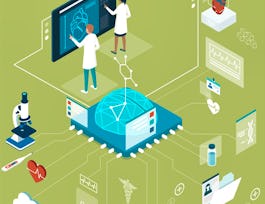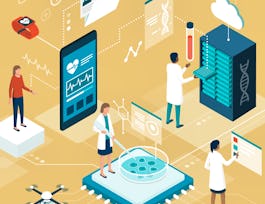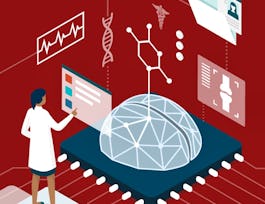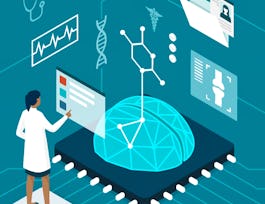This course introduces you to a framework for successful and ethical medical data mining. We will explore the variety of clinical data collected during the delivery of healthcare. You will learn to construct analysis-ready datasets and apply computational procedures to answer clinical questions. We will also explore issues of fairness and bias that may arise when we leverage healthcare data to make decisions about patient care.


Introduction to Clinical Data
This course is part of AI in Healthcare Specialization
Taught in English
Some content may not be translated



Instructors: Nigam Shah
19,158 already enrolled
Course
(291 reviews)
97%
What you'll learn
How to apply a framework for medical data mining
Ethical use of data in healthcare decisions
How to make use of data that may be inaccurate in systematic ways
What makes a good research question and how to construct a data mining workflow answer it
Details to know

Add to your LinkedIn profile
20 quizzes
Course
(291 reviews)
97%
See how employees at top companies are mastering in-demand skills

Build your subject-matter expertise
- Learn new concepts from industry experts
- Gain a foundational understanding of a subject or tool
- Develop job-relevant skills with hands-on projects
- Earn a shareable career certificate


Earn a career certificate
Add this credential to your LinkedIn profile, resume, or CV
Share it on social media and in your performance review

There are 8 modules in this course
What's included
12 videos2 readings3 quizzes
What's included
16 videos3 readings4 quizzes1 plugin
What's included
12 videos2 readings3 quizzes
What's included
18 videos2 readings3 quizzes
What's included
19 videos4 readings3 quizzes
What's included
11 videos3 readings3 quizzes
What's included
7 videos2 readings
What's included
1 video3 readings1 quiz
Instructors



Offered by
Recommended if you're interested in Data Analysis

Stanford University

Stanford University

Stanford University

Stanford University
Why people choose Coursera for their career




Learner reviews
Showing 3 of 291
291 reviews
- 5 stars
73.53%
- 4 stars
20.96%
- 3 stars
4.12%
- 2 stars
1.03%
- 1 star
0.34%
New to Data Analysis? Start here.

Open new doors with Coursera Plus
Unlimited access to 7,000+ world-class courses, hands-on projects, and job-ready certificate programs - all included in your subscription
Advance your career with an online degree
Earn a degree from world-class universities - 100% online
Join over 3,400 global companies that choose Coursera for Business
Upskill your employees to excel in the digital economy
Frequently asked questions
Dates and Duration
Original Release Date: 08/10/2023
Expiration Date: 08/10/2026
Estimated Time to Complete: 11 hours CME
Credits Offered: 11.00
Accreditation
The Stanford University School of Medicine is accredited by the Accreditation Council for Continuing Medical Education (ACCME) to provide continuing medical education for physicians. The Stanford University School of Medicine designates this enduring material for a maximum of 11.00 AMA PRA Category 1 Credits™. Physicians should claim only the credit commensurate with the extent of their participation in the activity.
Disclosures
The Stanford University School of Medicine adheres to ACCME Criteria, Standards and Policies regarding industry support of continuing medical education. There are no relevant financial relationships with ACCME-defined commercial interests for anyone who was in control of the content of this activity.
Access to lectures and assignments depends on your type of enrollment. If you take a course in audit mode, you will be able to see most course materials for free. To access graded assignments and to earn a Certificate, you will need to purchase the Certificate experience, during or after your audit. If you don't see the audit option:
The course may not offer an audit option. You can try a Free Trial instead, or apply for Financial Aid.
The course may offer 'Full Course, No Certificate' instead. This option lets you see all course materials, submit required assessments, and get a final grade. This also means that you will not be able to purchase a Certificate experience.
When you enroll in the course, you get access to all of the courses in the Specialization, and you earn a certificate when you complete the work. Your electronic Certificate will be added to your Accomplishments page - from there, you can print your Certificate or add it to your LinkedIn profile. If you only want to read and view the course content, you can audit the course for free.

